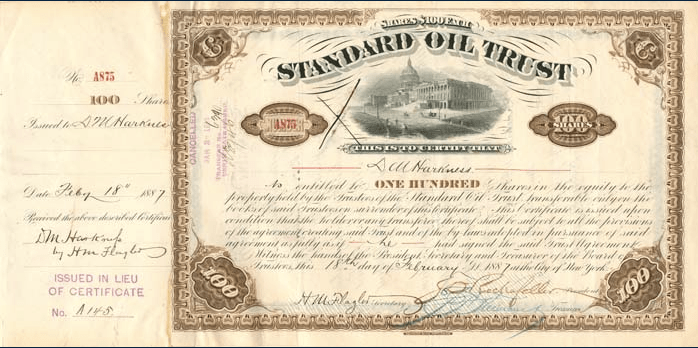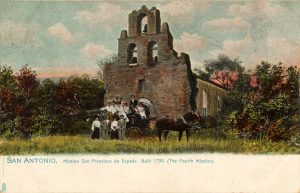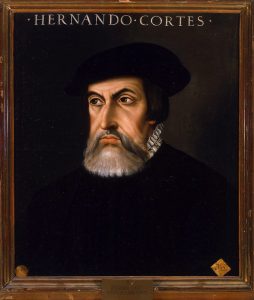Born in 1839, John D. Rockefeller was an American industrialist and philanthropist who built an oil empire by guaranteeing a uniform quality grade for his standard oil. He was one of the richest men in history. Rockefeller’s Standard Oil Company was perhaps one of the most powerful monopoly in America. At the time of his death, his wealth was estimated to be worth over half a-trillion dollars.

At the young age of sixteen, Rockefeller began attending community college. He was a student for three months until he found his first job as a produce clerk at a Cleveland commission firm where Rockefeller was the person who bought and sold commodities for clients for a commission. The firm bought and sold shipped grain, coal, and other raw materials. After three months, he was given a raise and became the cashier and bookkeeper for the firm. 1 At the age of nineteen, in 1859, Rockefeller borrowed money from his father and began his first business venture with Maurice B. Clark. They formed their own commission firm. Clark handled all the work in the field, while Rockefeller managed all of the bookkeeping and bank issues. They experienced great success the first year, bringing in $450,000 from buying and trading farm produce and supplies.2 Within that same year the first refinery was erected in Titusville, Pennsylvania. Cleveland became a refining center for the booming new industry, and in 1863, Rockefeller and Clark entered the oil business as refiners. With Samuel Andrews, who had plenty of experience in refining, joining the business, they now operated an oil refinery as well as the commission business. Within two years Clark was bought out by Rockefeller for $72,000. The new firm was named Rockefeller & Andrew, and promptly their business became Cleveland’s largest refinery.3
Shortly afterwards, Rockefeller partnered with his younger brother William, along with S. V. Harkness and H. M. Flagler, who helped set up favorable freight rates on the railroad. By 1870, the use of kerosene was rapidly spreading for the use of lighting. Rockefeller formed the Standard Oil Company of Ohio and within a year they were a one million dollar corporation making forty percent profit.4 Rockefeller bought out most of Cleveland’s refineries, as well as New York, Pittsburgh and Philadelphia. Rockefeller next turned to new transportation methods: railroads and pipelines. The Pennsylvania Railroad opened up a refinery in an attempt to stop Rockefeller from buying them out. By 1879, Standard Oil became a full industry monopoly by buying out rival refineries and distributing and marketing its products around the world. Standard Oil controlled ninety percent of America’s oil. In 1882, Rockefeller’s properties were combined into the Standard Oil Trust, which ensured that no one would ever be able to buy him out. Standard Oil Trust had an investment of seventy million, and there were forty-two certificate holders, or owners in the trust.5 Rockefeller was a target for muckraking, and people viewed him as greedy and selfish. He was a man who bribed other men to spy on competing companies, or threatened rivals to join the Standard Oil Trust, and he had no problem getting richer by the downfall of other men and their companies.

By 1890, the Ohio Supreme Court dissolved the Standard Oil Trust. However, the business was part of Standard Oil of New Jersey and was considered a holding company. Due to its legal designation it could not be touched. By 1911, after many years of arguing in court, the U.S. Supreme Court ruled that Standard Oil of New Jersey was in violation of the anti-trust laws and forced it to break up into more than thirty individual companies.6 That same year Rockefeller retired from Standard Oil and made a deal with Andrew Carnegie (a Scottish immigrant who made a fortune in the steel industry). Rockefeller sold Carnegie all his investment holdings. In this new role he handled all of Carnegie’s transportation on the Great Lakes. Rockefeller brought in 200 million dollars for the first time.7 In truth, he was not driven solely by profits. Rockefeller became a philanthropist donating to various educational schools, all kinds of religious churches, and scientific causes, and he funded the University of Chicago and the Rockefeller University. The total of Rockefeller’s philanthropies totaled an estimated 900 million dollars.8 He died at the age of ninety-seven, on May 23, 1937.
The impact of Rockefeller and his genius and business acumen are impossible to ignore. He is an icon in America history. In the end, Rockefeller had accomplished his goals. He did not let anything stop him and his ideas from coming to reality. He was a very smart man and used all his knowledge in creating and becoming one of the richest of men, greatest of philanthropists, and a very powerful man. He made a fortune and lived a simple life giving back to society. He made a promise to himself that he would give back ten percent of what he made and he did just that until his death.
- Encyclopedia of World Biography, 1998, s.v. “John Davison Rockefeller.” ↵
- Encyclopedia of World Biography, 1998, s.v. “John Davison Rockefeller.” ↵
- Encyclopedia of World Biography, 1998, s.v. “John Davison Rockefeller.” ↵
- Encyclopedia of World Biography, 1998, s.v. “John Davison Rockefeller.” ↵
- Encyclopedia of World Biography, 1998, s.v. “John Davison Rockefeller.” ↵
- Encyclopedia of World Biography, 1998, s.v. “John Davison Rockefeller.” ↵
- Alan Brinkley, American History: Connecting with the Past Volume 2 (Fifteenth Edition, McGraw-Hill Education, 2014), 464-65. ↵
- Encyclopedia of World Biography, 1998, s.v. “John Davison Rockefeller.” ↵




35 comments
Yahaira Martinez
i had actually never heard much about Rockefeller prior to this article and i never knew how much of a fortune he obtained by his hard work. Although seeming like he would be a very greedy person, the article managed to capture a different side of his personality and his actions by speaking about his philanthropist lifestyle, which allowed the readers to look at him from a more relatable view.
Auroara-Juhl Nikkels
In high school, I remember learning that Rockafeller was the oil guy. And that he had a lot of money. That was pretty much all I knew about him. Your article opened my mind about who he was and what he did. I learned so much more about him than I did in high school and what he did for the community. I did not know he was a philanthropist and wanted to help so many different causes. I am glad you included that part of who he was on your article. Very good job!
Saira Castellanos
I think all people know is that Rockefeller was in the oil business. Thats the limit of my knowledge about him anyway, and also that he was ridiculously rich. Its pretty amazing how one man can help so many people and help different causes. I always thought that he was the same as all rich people, always so greedy. I am glad to see a nice side of this philanthropist. Great article!
Osman Rodriguez
I never knew much about Rockefeller aside from the fact that he was in the oil business and amassed a fortune. He is indeed an interesting man and one that helped many people and different causes. Reading about his philanthropist side was warming and something I hope to one day personally relate to. I agree with giving back to the community and its people. Hopefully someday I will be able to do that in a way I see fit.
Tyler Sleeter
Very informative article. I had heard of JD Rockefeller in association with Standard Oil and the monopolies of that time period. I was not aware he was a philanthropist and he had started two universities. Rockefeller was a good businessman although he would sometimes stoop to unethical practices to stay on top. I think it was admirable that he kept his vow to give back 10% of his money during his lifetime.
Sergio Cervantes
Who knew a young man starting out working a humble position would eventually be one of the richest men in the world! I enjoyed reading about his early life, the amount of education he received, and all of his associates. This man was definitely ahead of the game, monopolizing a large part of the US oil industry. It is interesting to see how he ventured out and formed partnerships with other individuals to beat the competition. It shows that this man knew what he wanted and how he should go about accomplishing his goal. The fact that he gave back shows that he was somewhat generous and kind!
Hayden Hollinger
After reading this article I had a strong admiration for the work ethic of John D. Rockfeller. It was surprising to read he began attending community college at such a young age and was able to make his way to success very quickly. Rockefeller is a man who has gone down in history and will remain there for a long time to come, this article did a very good job in highlighting that.
Alexis Soto
John D. Rockefeller’s legacy has left him a legendary and infamous figure in history. Many know of his business dealings so it was refreshing to read of his modest beginnings and his role in philanthropy as they tend to be overshadowed. Rockefeller was still a man and an extremely religious one at that so helping those in need was something he genially believed in. Perhaps his greatest legacy was inspiring modern day billionaires to also use their wealth for charitable causes
Nahim Rancharan
This article was a very interesting read! I did not know much about Rockefeller other than the fact that he was an icon American History and a pioneer in the capitalist movement in America. JDR is a perfect example of the American Dream. The fact that a man with humble beginnings could become something greater with effort and perseverance. His many accomplishments have set a new standard for excellence and has served as motivation for many people in America. Great Article!
Erik Rodriguez
Awesome article! He definitely is one of the most successful businessman to have ever lived. It is crazy how from the age of 19 he was able to start his own business! Not to mention, he still gave back to the community despite his status!
SUPER informative and well written article, great job!!